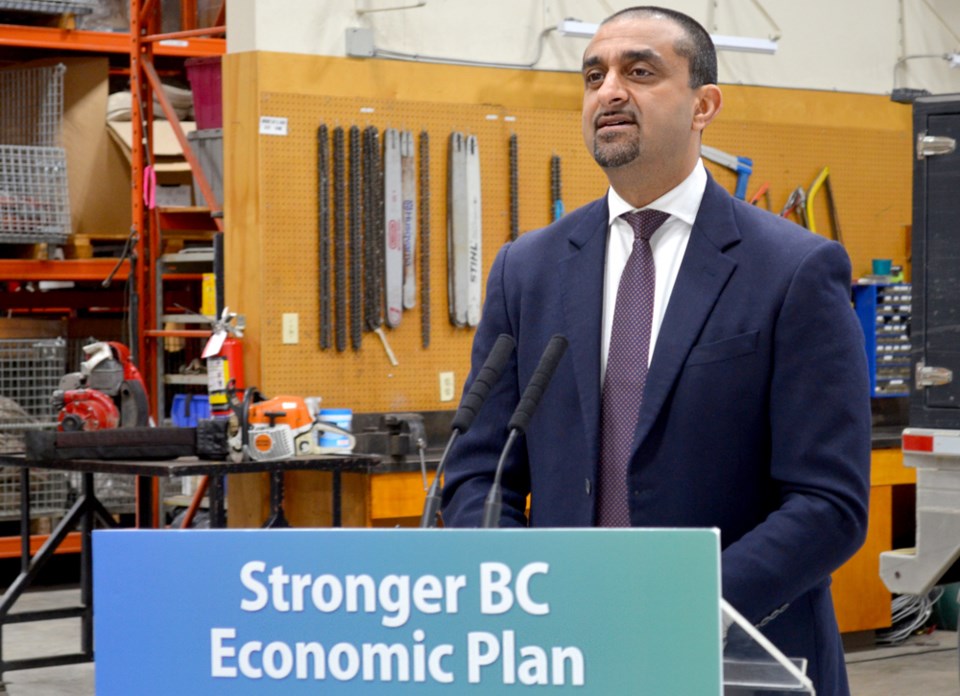The B.C. government is urging the Bank of Canada to hold off increasing interest rates in the wake of a surprise jump in inflation.
Premier David Eby has previously questioned the bank’s aggressive approach to interest rate hikes, saying in July that increased mortgage costs have been “devastating” and pushed some homeowners to the brink.
Housing Minister Ravi Kahlon upped the public pressure Tuesday, in response to new Statistics Canada figures that showed the Consumer Price Index jumped 3.3 per cent. The increase was higher than expected by economists, many of whom warned it could pressure the bank to increase rates again in September. The jump came after inflation hit a 27-month low in June of 2.8 per cent.
“I'm certainly concerned,” said Kahlon. “Surely (Bank of Canada officials) read the same thing that we read, which is, the interest rates going up were a large part of the reason why inflation is going up.
“I certainly hope that they reflect on the fact that this is actually really hurting people in communities throughout the province, and take all that into consideration before they make any other moves.”
The Bank of Canada has increased interest rates 10 times since March 2022, in an attempt to get inflation to around two per cent annually. The current key lending rate of 5 per cent is the highest in 22 years.
A major driver of the inflationary increase was a 30.6 per cent spike in mortgage costs, compared to July 2022.
Homeowners are now caught in a kind of economic feedback loop, with the Bank of Canada raising interest rates to fight inflation, but those higher interest rates hitting mortgages so hard they are in fact increasing the very inflation that the Bank of Canada is trying to cool with the higher rates.
The impact has been profound on British Columbians, especially in cities like Victoria and Vancouver, where property values are already some of the highest in Canada. The high cost of borrowing has also caused some new housing projects to be stalled or cancelled, further exasperating government efforts to build more supply to ease prices.
“The formula to address inflation was built for a certain time, and I think many would wonder whether the same formula is the one that should be working right now,” said Kahlon.
“The Bank of Canada is independent, they're making decisions. But when I read the reports that are coming out with the inflation numbers, and I see that interest rates are the main one of the main drivers, the largest driver of inflation, surely they're looking at that and saying, ‘Okay, well, you know, maybe we need to pause and reflect.’”
While interest rates may be pushing up the cost of inflation, the new CPI figures do not directly address the cost of rent, which is also skyrocketing. New data from Rentals.ca showed the average price of a one-bedroom apartment in Â鶹´«Ã½Ó³»hit $3,013 per month in July, and $3,918 for a two bedroom. The rental market is the most expensive in Canada.
“Right now with all the other costs going up, and rents going up, it’s a bit of a perfect storm,” said Kahlon.
Kahlon said he met with new federal Housing Minister Sean Fraser this week to discuss how Ottawa could help boost construction of new rental units.
“I basically pleaded to him, Canada needs to get back into the game and into housing in a big way,” said Kahlon. “It’s refreshing to hear the new federal minister say that they never should have left. So that’s a starting point.”
B.C. doesn’t have much influence on inflation, or the Bank of Canada. Nonetheless, the province has tried to respond to the affordability crisis with a series of small-scale rebates and tax credits.
Critics say it’s not close to enough.
“What we’re seeing in B.C. is for the 10 months now that David Eby has been premier, he promised 100 days of action on housing and affordability and unfortunately we’ve seen everything go the opposite way,” said BC United finance critic Peter Milobar.
“There’s a lot of government policy that could have been enacted over the last while that would have definitely helped.”
Kahlon said affordability remains a constant topic at the cabinet table, despite the new worrying inflation numbers.
“We know there’s a lot more work to do,” he said.
Rob Shaw has spent more than 15 years covering B.C. politics, now reporting for CHEK News and writing for Glacier Media. He is the co-author of the national bestselling book A Matter of Confidence, host of the weekly podcast Political Capital, and a regular guest on CBC Radio. [email protected]



